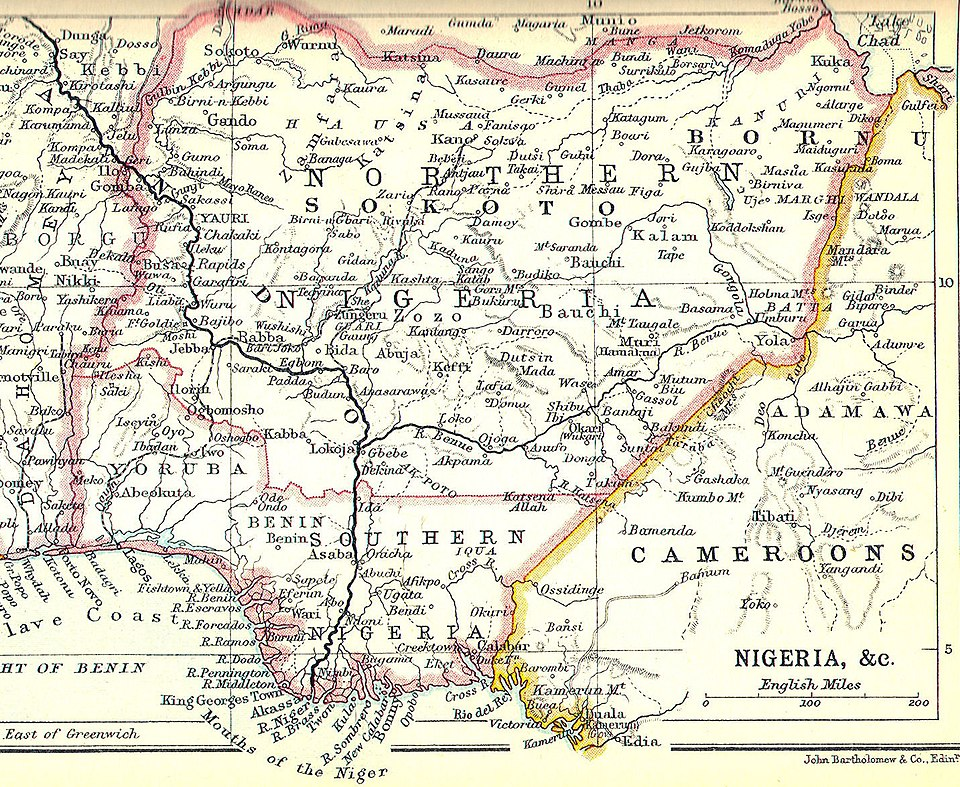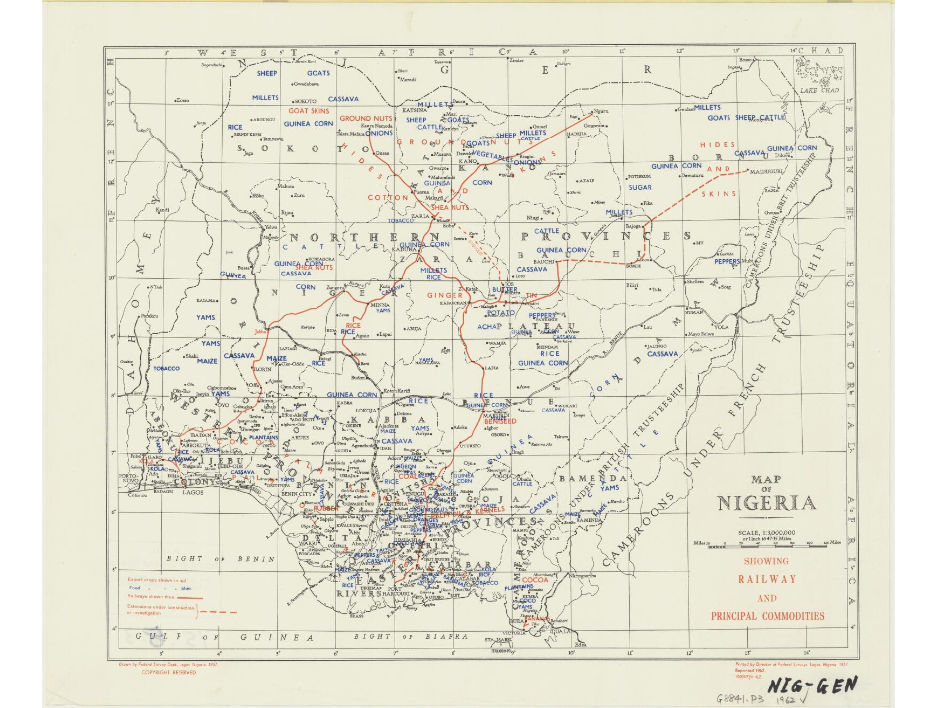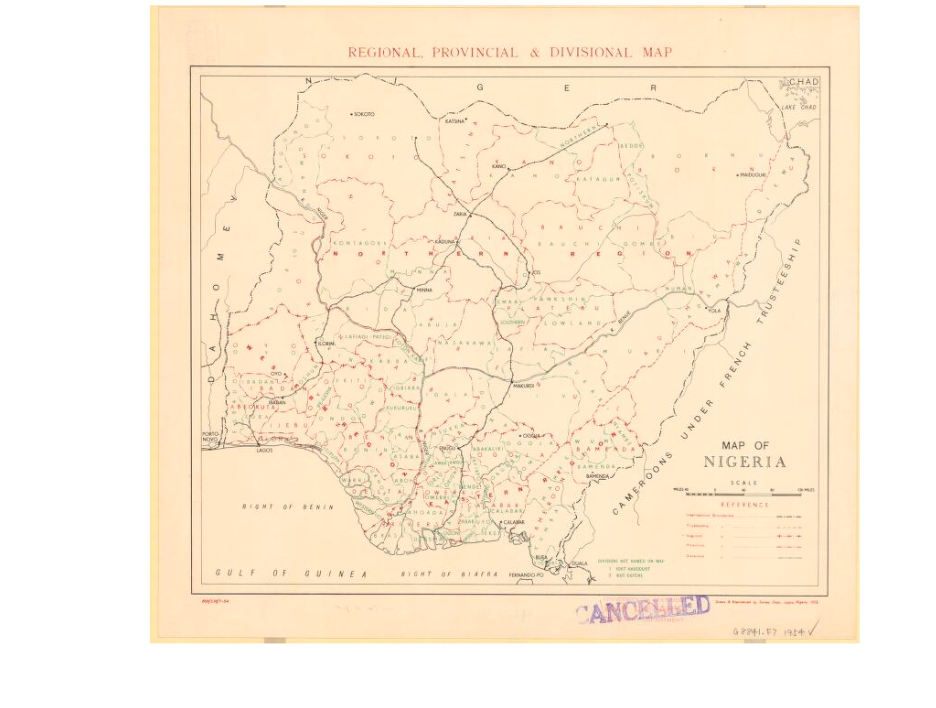IB Syllabus focus:
'Investigate the administrative systems in Nigeria, including direct and indirect rule; factors influencing these choices; economic and social development; regional rivalries; and constitutional developments leading to independence in 1960.'
This exploration delves into the varied governance approaches the British used in Nigeria, assessing the intricate web of direct control and local leadership leverage.
Introduction to British Rule in Nigeria
When Britain colonised Nigeria, they encountered a vast array of ethnicities, languages, and cultures. This diversity necessitated a tailored approach to colonial administration, resulting in the adoption of both direct and indirect rule across the region, each with profound impacts on the country’s path to independence in 1960. Similar adaptive strategies were also evident in the colonial administration of Gold Coast (Ghana), showcasing the British versatility in colonial governance.

Map showing the British Northern Nigeria and Southern Nigeria protectorates around 1914, just before and during the amalgamation that created a single Colony and Protectorate of Nigeria. The contrasting administrative legacies help explain the divergent use of indirect rule in the north and more direct forms in the south. Source
Direct Rule
Characteristics of Direct Rule
British officials administered the territories, sidelining local leaders.
Implemented European laws, disregarding local customs and legal systems.
Introduced British education systems, reducing the influence of Islamic education in the North.
Instituted direct taxation systems to support colonial administration and British economic interests.
Implementation and Impact in Southern Nigeria
Dominant in Southern protectorates due to the absence of centralised political structures.
British education led to the emergence of a Western-educated elite who later became instrumental in the independence movement.
Facilitated the growth of cash crop economies, particularly in cocoa, rubber, and timber, which linked Nigeria into the global market, albeit primarily for the benefit of British industry.
Direct rule caused social changes, fostering urbanisation and creating a working class and a business class within the Nigerian society.
Indirect Rule
Lord Lugard and the Indirect Rule System
Lord Frederick Lugard’s system capitalised on existing traditional hierarchies, specifically in the Northern Emirates. His Dual Mandate philosophy can be compared to other colonial strategies, such as the Ethiopian resistance under Menelik II, which presented unique challenges to colonial powers.
The system was seen as a manifestation of Lugard’s Dual Mandate philosophy – aiming to develop the colony for both British and local interests.
Functionality and Outcomes
In the Northern regions, the system bolstered the emirs' power, who acted as colonial agents.
Although it maintained traditional structures, indirect rule also led to the entrenchment of the power of certain ethnic groups over others, sometimes exacerbating pre-colonial tensions.
Advantages and Challenges
Economically advantageous for the British who saved costs by utilising existing African institutions.
However, the system often marginalised minority groups and prompted grievances due to the authoritarian rule of the emirs, which was reinforced by colonial support.
Factors Influencing the Choice Between Direct and Indirect Rule
Economic Considerations
Areas with valuable resources or economic potential, like the Southern palm oil belt, were often under more direct control to ensure British dominance over lucrative trade.
Ethnic and Social Structures
The structure of local societies heavily influenced the method of governance; homogenous and centralised societies were easier to control indirectly.
Resistance and Control
The degree of resistance encountered by the British also determined their approach; more resistant areas faced more direct control to quash dissent and maintain order. This was evident in the Abyssinian crisis and the League of Nations' response, highlighting the complexities of colonial control and international politics.
Economic and Social Development under Colonial Rule
Introduction of the Colonial Economy
The colonial economy was structured to service the British Empire, with Nigerian resources extracted for export.
Infrastructure such as the railways was developed primarily for resource extraction rather than to benefit the local population.

Federal Surveys map (1957; 1962 reprint) showing Nigeria’s main rail lines and the locations of principal export commodities (e.g., cocoa, groundnuts, palm produce). It illustrates how transport corridors were planned to move resources from interior zones to ports, underscoring the colonial economic orientation. Source
Social Engineering
The colonial administration shaped societal change, introducing Western education and Christianity, especially in the South, leading to a gradual decline in traditional societal structures.
Urbanisation and Its Effects
Economic activity around colonial administrative centres led to urbanisation, which in turn gave rise to new social classes and professional groups. The spread of Islam and Christianity in Africa during the 19th and 20th centuries also played a significant role in shaping the continent's socio-political landscape.
IB History Tutor Tip: Understanding the British implementation of direct and indirect rule in Nigeria is crucial to grasping the diverse colonial legacies that influenced the country's path to independence.
Regional Rivalries and the Path to Independence
Foundation of Regional Disparities
The differing methods of colonial administration accentuated regional disparities, which laid the foundation for later political tensions.
The North, ruled indirectly, remained more traditional and less economically developed compared to the South.
Political Awakening and Party Formation
The educated elite began forming political parties that represented the interests of different regions, such as the Northern People’s Congress (NPC) in the North and the National Council of Nigeria and the Cameroons (NCNC) in the East.
Constitutional Milestones
The progression towards independence was marked by constitutional reforms, gradually increasing Nigerian representation and self-governance.
The Lyttleton Constitution of 1954 was significant for establishing a federal structure, reflecting the divergent interests of Nigeria’s regions.

Federal Surveys map (1954) depicting Nigeria’s Northern, Western, and Eastern Regions at the time the Lyttleton Constitution established a federal structure. Provincial and divisional boundaries appear as additional detail not required by the syllabus but helpful for context. Source
Nationalist Movements and Independence
Nationalist movements grew, inspired by global decolonisation trends and led by educated Nigerians who were frustrated with colonial rule.
Key figures like Nnamdi Azikiwe and Obafemi Awolowo argued for Nigerian autonomy, contributing to a relatively peaceful transition to independence.
IB Tutor Advice: Focus on comparing the impacts of direct and indirect rule in Nigeria, highlighting how these governance methods shaped societal changes and contributed to the independence movement.
Nigeria’s Independence in 1960
Nigeria’s journey to independence was the culmination of various nationalist efforts, constitutional evolutions, and political negotiations. The British relinquished control on October 1, 1960, giving birth to a new nation that had to face the challenges of uniting diverse peoples with different historical experiences under colonial rule. The impact of both direct and indirect rule left an indelible mark on Nigeria's political, social, and economic landscape, shaping the country's post-independence trajectory. The social and economic challenges in post-independence Africa further illustrate the lasting effects of colonial policies on the continent.
FAQ
British rule contributed to the emergence of nationalist movements in Nigeria by creating a Western-educated elite who became increasingly aware of global movements for self-determination and critical of colonial rule. British policies, especially the imposition of direct taxation and disrespect for indigenous cultures, stoked discontent. Moreover, the introduction of Western political ideas, such as democracy and liberalism, provided Nigerians with the ideological tools to challenge colonialism. This education, combined with the experience of participation in World War II, led many Nigerians to question why they were not entitled to the self-governance that they were fighting for abroad. The contradiction between colonial practices and the ideals espoused by the British helped fuel nationalist sentiments.
Resistance to British rule occurred in various forms across Nigeria, from the early military confrontations to later organised political opposition. Notably, the Igbo and the Yoruba peoples in the south had societies that were highly decentralised, making direct rule difficult to implement and leading to resistance against the British. The British response to resistance was often military, exemplified by the use of force in both the conquest and subsequent control of regions, including the notorious use of the Maxim gun against the kingdoms of Benin and Oyo. However, over time, the British also employed political strategies, such as forming alliances with certain leaders and co-opting resistant groups through various concessions, including participation in the colonial administration.
Christian missionary activity played a transformative role in Nigeria during British colonial rule. Missionaries were particularly active in the south, where they introduced Western education and healthcare. The spread of Christianity went hand in hand with colonial expansion, facilitating the British administrative grip on the region. Missionaries often challenged traditional beliefs and practices, leading to a cultural shift and the conversion of a significant portion of the population to Christianity. The activities of missionaries thus not only changed the religious landscape but also were pivotal in the rise of an educated African elite who would later be influential in the nationalist movements for independence.
British colonialism had a varied impact on the different ethnic groups within Nigeria, largely due to the application of indirect rule in the north and direct rule in the south. Indirect rule in the northern regions often entrenched the power of the Hausa-Fulani ruling class, which maintained the Islamic and traditional feudal system. In contrast, the southern regions saw the undermining of local authority structures, leading to a weakening of the influence of ethnic leaders. This contributed to tensions between and within regions, as minority groups often felt marginalised or oppressed, setting a stage for ethnic conflicts that have continued into post-independence Nigeria.
The British administration's economic policies in Nigeria largely stymied the country's path to industrialisation during the colonial period. The focus was on raw material extraction and the cultivation of cash crops for export to the British Empire. This emphasis diverted resources away from industrial development and created an economy that was dependent on agriculture and the export of raw materials. Nigeria's infrastructure, such as railways and ports, was developed to support these exports rather than to stimulate local industry. Consequently, the country entered the post-independence era with a weak industrial base, a legacy that has affected its economic trajectory for decades.
Practice Questions
Indirect rule in Northern Nigeria effectively maintained traditional structures and authority to a significant extent. The British relied on existing political systems, empowering emirs and local chiefs to govern under colonial oversight. This preserved the emirate system and upheld the Sokoto Caliphate's hierarchical nature. While reinforcing traditional rulers' status, it also entrenched the authority of the dominant ethnic groups and, in many cases, ossified the pre-existing social stratifications. Nonetheless, indirect rule inadvertently caused certain modernising influences by bringing these traditional structures into a broader administrative framework that linked them to the colonial state.
British colonial economic policies profoundly impacted Nigeria's social development. By introducing cash crops and focusing on export-oriented agriculture, the British altered traditional agrarian societies, causing a shift in labour patterns and societal roles. The emphasis on exports like cocoa and palm oil led to the creation of a new mercantile class and the introduction of a wage economy. However, it also resulted in economic disparity and heightened class consciousness. British economic policies encouraged urbanisation, leading to the growth of cities and the emergence of an urban working class. These changes underpinned social mobility and ultimately contributed to a societal framework that facilitated nationalist sentiments and the push for independence.

